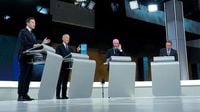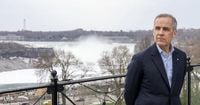As Canada gears up for its upcoming election on April 28, 2025, the political landscape is heating up with vibrant debates and critical voter engagement. Over the past week, leaders from major parties participated in high-stakes debates in both French and English, where they pitched their visions for the future of the nation amid growing concerns about foreign influence and domestic issues. The spotlight was on Liberal leader Mark Carney, Conservative leader Pierre Poilievre, NDP's Jagmeet Singh, and Bloc Québécois leader Yves-François Blanchet, who all faced off in a series of discussions that have captivated the electorate.
Voter feedback has been mixed, showcasing a range of opinions on the candidates' performances and the overall quality of the debates. Kim Perron, a 36-year-old from Ottawa, expressed her appreciation for the substance of the discussions, stating, "I think it was a bit more centred around content than blaming one another. I find it refreshing that Carney is not a career politician, and it showed in the debate." She believes Carney has the best plan for the country, despite her values aligning more closely with the NDP.
Conversely, John Craig, a 64-year-old construction worker from Mississauga, found the overall quality of the debate disappointing but declared Poilievre as the clear winner. "The debate was all very respectful. I didn't get a sense that anyone was having a go at each other, unlike in the good old days of hot-headed debate," he noted. Craig felt Poilievre made significant points regarding the previous Liberal government's tenure, asserting, "Carney tried to pitch himself as some kind of Lancelot figure, but didn't come across as different to what was there before."
Thomas Stenlake, a 29-year-old first-time voter from Hamilton, shared a more positive view of the debates, noting that they remained civil and focused on key issues, including foreign influence and environmental concerns. He remarked, "The loser of the debate was Jagmeet Singh. He came across a bit desperate and frantic in the way he was trying to attack on multiple fronts." Stenlake emphasized the importance of a strong Canada in the face of external threats.
Thierry Pouliot, a 54-year-old from Montreal, highlighted the contrasting rhetoric between the Liberal and Conservative parties, noting Poilievre's more prime ministerial demeanor compared to his previous attack-dog persona. He found Carney's confidence refreshing and appreciated a standout moment when Carney challenged Poilievre on the carbon tax, stating, "It may be difficult for Mr. Poilievre, you spent years running against Justin Trudeau and the carbon tax and, they’re both gone."
In Alberta, Lindsey Juniper, a retired civil servant, was impressed by the performance of Yves-François Blanchet, even though she does not plan to vote for him. She noted, "From a western Canadian perspective, the Bloc Quebecois leader had a few good comments." Juniper praised Carney for his well-thought-out plan regarding security and Canada's sovereignty.
Meanwhile, Andrew Flostrand, a 57-year-old university professor from British Columbia, expressed confidence in both Carney and Poilievre as capable leaders. He stated, "I'm personally confident that either Pierre Poilievre or Mark Carney are capable leaders, and I'm not worried about whether the wrong person wins." Flostrand also mentioned concerns about global crises, particularly referencing Donald Trump's unpredictable behavior.
Adrienne Winrow, a 41-year-old from Montreal, praised the debates as a demonstration of Canada's strong democracy but wished for more concrete discussions on climate policy. She highlighted Carney's proposal for free trade by Canada Day and a national bureau to tackle the housing crisis as promising ideas. However, she expressed disappointment over the lack of commitment to climate action, which she believes should have been a focal point of the discussions.
The debates have also been marked by the looming presence of both Donald Trump and former Prime Minister Justin Trudeau, with Carney leveraging Trump's threats to bolster his campaign. "We can give ourselves far more than Donald Trump can ever take away," Carney stated emphatically during the debates. He further elaborated on the need for preparedness in the face of potential crises, saying, "In a crisis, you got to plan for the worst, the worst is that the US actually does want to take us over." This framing has resonated with voters who are concerned about external threats to Canadian sovereignty.
Pollster Andrew Enns describes the current race as "parked," suggesting that while Carney has gained momentum, there remains a desire for change among voters after nearly a decade of Liberal governance. Enns noted, "I think Mr. Carney took some body blows," referring to the exchanges with Poilievre, but he doesn't believe these will significantly alter voter intentions.
As the election date approaches, the candidates will need to continue addressing pressing issues such as climate change, economic stability, and national security to capture the attention of the electorate. With the stakes high and the political landscape shifting rapidly, the coming days will be crucial for all parties involved.
In a broader context, Carney has also identified China as a geopolitical threat, emphasizing the need for vigilance against foreign interference in Canadian affairs. This stance could further shape the political discourse as voters consider the implications of international relations on domestic policy.
As Canadians prepare to cast their votes, the debates have provided a platform for candidates to articulate their visions and engage with the electorate. With just over a week until election day, the race remains tightly contested, and every moment counts in this fast-paced political environment.






